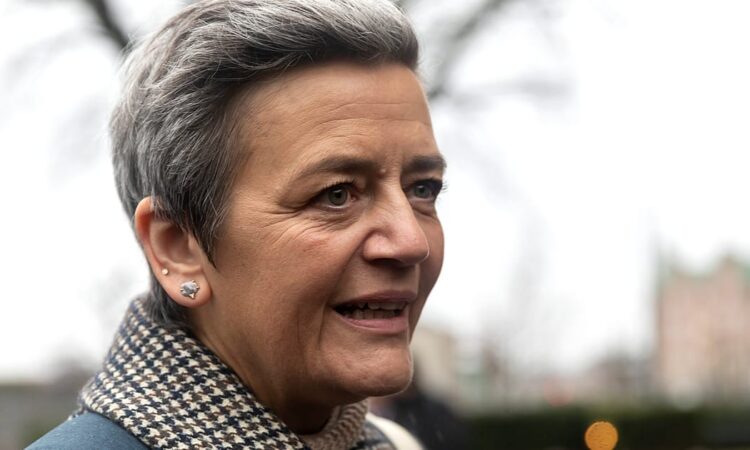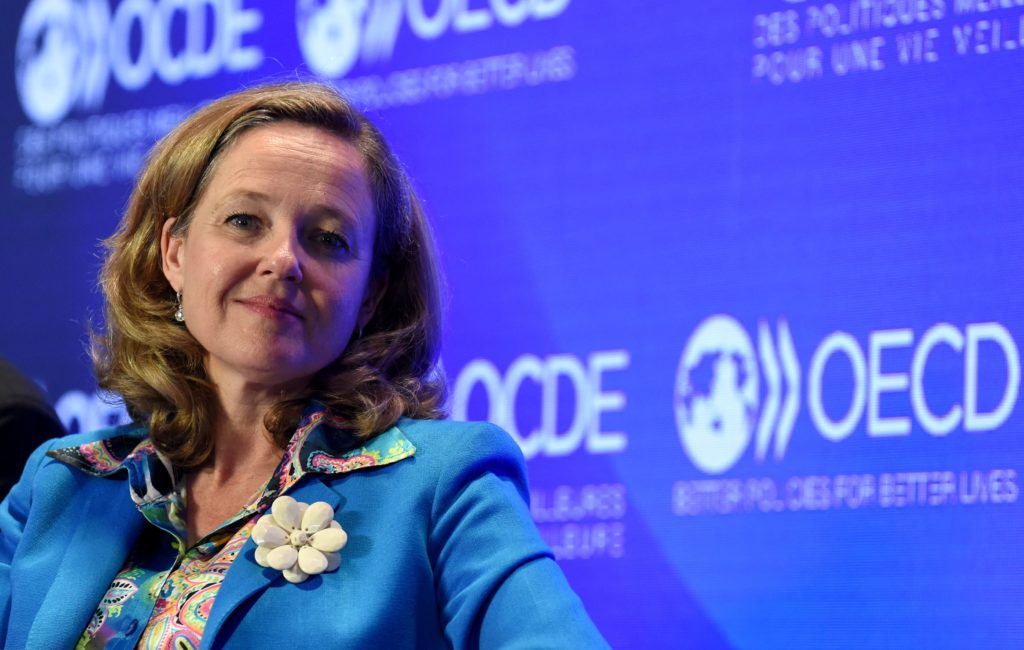
Press play to listen to this article
Voiced by artificial intelligence.
BRUSSELS — Whether it’s the European Commission or the European Investment Bank, “President Margrethe Vestager” just hasn’t happened.
The feisty Dane is a Eurocrat superstar in charge of powerful digital and antitrust portfolios who has squeezed billions of euros in antitrust penalties out of Google. But she failed to get the political consensus she needed from European Union governments to nab the top job at the EU’s state-backed lender, losing out to Spain’s Nadia Calviño.
“I will resume my duties at the European Commission,” Vestager said on X, saying she had withdrawn after ministers finally agreed on Calviño.
Vestager now has very little to lose and a lot she could do to make the rest of her term count.
“She has another 11 months; it is very short,” said Antoine Winckler, a partner at Cleary Gottlieb Steen & Hamilton. “She has a lot of very important state aid cases … merger control, the Alitalia thing.”
For digital and competition followers, Vestager has been missed. She went on leave just days before the Commission rolled out its hit list of Big Tech gatekeepers as part of the Digital Markets Act, legislation she fostered to help enforcers clamp down on bad behavior that antitrust cases had failed to fully constrain.
That effectively handed a large part of the EU’s digital leadership to Thierry Breton, a Frenchman who has styled himself as the bloc’s digital enforcer and squared off against Elon Musk’s X for disseminating disinformation.
German socialist lawmaker René Repasi expects dissension between Vestager and internal market chief Thierry Breton also “will be back on the agenda when we look at state aid.” He also sees a potential row ahead over France’s desire to do more to subsidize nuclear energy.
French friction
France was once Vestager’s biggest fan. French President Emmanuel Macron backed her in 2019 as the centrist Renew party’s candidate to head the Commission. There again, she was pipped to the post as leaders then dodged party candidates to choose Ursula von der Leyen, with Macron’s support.
But the French love of government playing a strong role in the economy has frequently led to a testy relationship with the Commission’s competition enforcers. Not least in recent years as Vestager clashed with Finance Minster Bruno Le Maire over a French-sponsored train deal and then had to bow to a call to open up more energy subsidies.
This summer saw French politicians take to social media to fume over Vestager’s choice of an American for a top EU post. The American, a respected economist, pulled out.
Vestager was mindful of tiptoeing around the French, pitching her EIB job bid as a voice for the EU’s smaller nations even as was cautious about a French push to fund defense and nuclear investments. She tried to win over France and Le Maire, and even made a play for local tech entrepreneurs by showing up at a Paris digital day.

But any top EU job needs backing from the big two, both France and Germany, and Germany’s Scholz came out early for Calviño.
Vestager’s Friday message thanked “all of those who have reached out with support to me to reform the bank and make it more strategic, faster and more relevant.” She also thanked the Danish government for putting her forward after some grumbling that she had been absent for three months as Denmark’s commissioner.
Losing out on the EIB ends a campaign that started in June when she said she was planning to run. She took unpaid leave from her post as the Commission’s executive vice president for a digital age and competition commissioner in September to hit the campaign trail, handing over her digital file to Věra Jourová and her competition post to Didier Reynders.
She comes back to a depleted Commission as other top officials — Frans Timmermans, Mariya Gabriel and Jutta Urpilainen — have already jumped ship for other jobs or campaigns and the Brussels lawmaking machine will seriously slow down next spring as the European Parliament readies for elections.
A new competition landscape
Returning to the Berlaymont could see Vestager face some tough battles ahead, both with an increasingly powerful Breton and with Big Tech firms and how they comply with new digital rules. Apple, Meta Platforms and TikTok are all challenging EU decisions under its new Digital Markets Act, which sets tight regulatory curbs from March.
Already facing a slew of court defeats over her battle against big business’s sweetheart tax deals, Vestager would be sitting at the Berlaymont to hear if the EU’s top court will back her next week on a tax state aid case for Amazon and next year for a landmark €13 billion back-tax order for Apple. Rulings on Google’s appeals against two massive fines are also pending.
But there is some meat for an antitrust warrior to get her teeth into in the coming months. The Commission is in the final stages of a probe into music-streaming service Spotify’s complaint against Apple’s app store rules that could end with a fine — or more crucially an order for Apple to make changes app developers have been crying out for.
And there’s a high-profile investigation into Google’s advertising technology business where Vestager touted a potential break-up, which would be the strongest move yet in a regulatory war against Big Tech. After criticism that €8 billion in EU fines haven’t forced Google to make the changes smaller services wanted, Vestager could yet push her antitrust legacy into new territory.
“She can try to finalize as many cases as possible, and if she has the opportunity, she will wrap up the Google case,” said Cecilio Madero Villarejo, a former Commission antitrust official now working as a consultant for APCO Worldwide.
“She can take care of her legacy. I think this can be one of the main reasons to come back,” he said.
Laurens Cerulus contributed reporting.
CORRECTION: This story has been updated to clarify that Meta is challenging Commission decisions made under the Digital Markets Act.





